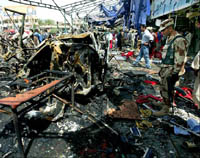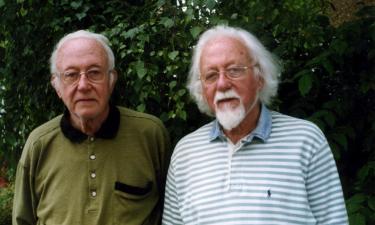World becomes slightly safer as number of violent conflicts falls
The German tendency towards precision and order is well known. In all likelihood it is this characteristic which explains the Germans’ desire to use mathematical tools as precisely as possible in the social sciences, including the study of international relations. German centres of expertise are especially famous for scrupulously calculating each year the number of conflicts and wars raging on the planet.

Among the many prestigious institutes involved in this survey, the Centre for the Study of Conflicts at the famous Heidelberg University is especially well respected. Last year specialists at this centre counted 249 political conflicts, 74 crises where violence was employed, 22 very serious clashes and two full-scale wars. This represents a certain improvement in comparison to 2004. In the previous report, it was not only the events in Iraq and Sudan which were described as wars, but also the clash in the Democratic Republic of Congo, where a certain truce can now be observed.
There are now also fewer crises which threaten to soon turn into full scale wars – 22 versus 25 in 2004. A significant reduction can also been seen in other factors. On the other hand there are now much more reasons for disputes, hidden, non-violent confrontations and conflicts which can be solved through political means. In other words adversaries often do not venture to go to war, but sometimes when necessary, just like before, they do not hesitate to employ force in order to solve disputes.
Where then is violence practically the norm? In Africa this is the case in Algeria, DR Congo, Sudan, Uganda, Burundi; in the Americas in Colombia and Haiti; in Asia in some parts of India, Laos, Nepal, the Philippines; in the Middle East in Iraq, Afghanistan, Kurdistan and Yemen; as usual the situation is uneasy in the Russian Northern Caucasus.
Wars between states are being ever more consigned to history. Even the situation in Iraq is defined more as a fight between various local groups, in particular as a confrontation between the Sunni and Shiite communities. It is interesting that, in commenting on the potential reasons for future conflicts, the experts at Heidelberg University note that like in the past they will be mostly caused by disputes between various states.
Surprising as it may be, just as before most conflicts are caused by ideological disagreements. The second most common reason for violent disputes is the fight for power. However violence is more often employed due to territorial disagreements. Putsches, which were so common during the years of the Cold War have now become extremely rare. As a rule, current-day conspirators manage without resorting to unnecessary brutality.
In 2005 the German researchers recorded just three coups: In Mauritania, without any excess unrest the military quietly removed President Maaouya Ould Sid’Ahmed Yaya, who had lost the support of the people, whilst he was traveling. The Nepalese King Gyanendra dissolved the government (which he admittedly sincerely regretted following a revolt by the people, having set the political process back onto its usual traumatic course), and the Kyrgyz President Askar Akaev, in disgust with his ungrateful people, returned to mathematics which he so dearly loved.
It seems that on the whole the statistical calculations confirm the long-held theory by academics of the trend towards a humanization of international relations. The only regret is that it has not led to the total disappearance of violence from world politics – the massacre in Darfur and the bloody chaos in Iraq along with dozens of smaller-scale wars continue unabated. But even so, following the lead of the German researchers, there is the desire to be optimistic.
Subscribe to Pravda.Ru Telegram channel, Facebook, RSS!




